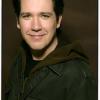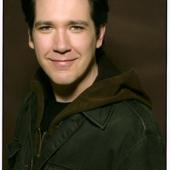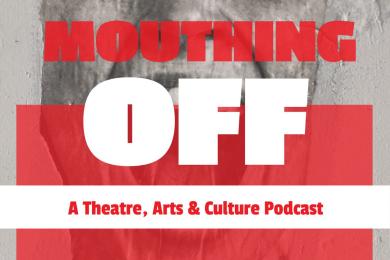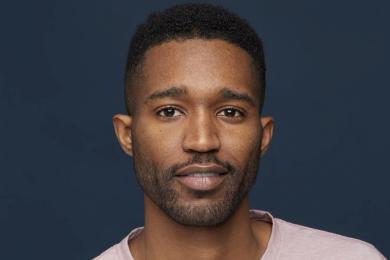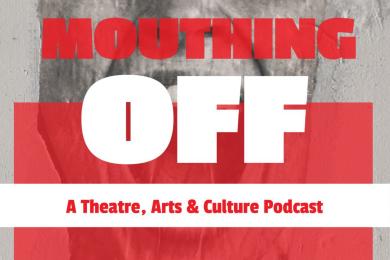Playlist profile: Kris L. Nelson
Interview

I met Kris Nelson on Memorial Day in the backyard of his South Minneapolis home in the company of his extremely friendly dogs. We talked theater (big and small) and impossible ambitions. His dream career surprised me and his devotion to truth in art impressed me.
Audiences are familiar with Kris from his long career at the Guthrie and his frequent collaborations with Ten Thousand Things Theater. Currently he is making his second appearance with Dark and Stormy Productions in the Adam Bock play The Drunken City. I’ve had the pleasure of acting in shows with Kris a number of times over the years, including in this current show, and it was with great pleasure that I started this talk where I got to know a new side of him.
How’s the show going?
I think it’s going really good. I like doing this show, and I think it’s because it’s so intimate, and it’s so immediate, and it generates its own velocity. So it’s really a show that’s different from other shows, because I can show up at the space and say my first line and let everything go from there. I don’t have to spend a lot of time manufacturing a world in my mind. I can just step on stage and wait for someone to say something and then say something back, and then because of the velocity of it, it just kind of takes care of itself.
How is it working with the person you’re married to [Tracey Maloney, who’s also in The Drunken City]?
I love working with Tracey and this is the third show in a row we’ve done together. We did Othello together and Christmas Carol together, and now this, so that’s unusual. I love it because I like spending time with her: that’s why I married her. So it’s great in that respect, but for the most part we don’t get much stage time together, so we don’t really interact. But I think it’s different in that, because she’s my wife, I’m a little more considerate of her as a scene partner than I would be with someone else. I take more care when working with her.
Who are some of your favorite actors?
My opinion of actors is that, I have tremendous admiration for anyone who gets up in front of people and does something. And I tend not to put individuals on a pedestal because when I was younger and I did that, I ended up somehow going and seeing movies and stage shows with the mind of a critic. I would have expectations that I’m waiting for them to meet. It almost sets up an idea in my head of what I’m expecting to see and if it’s different it takes me a while to adjust. I tend be a bigger fan of moments. Where I’m thrilled and excited and irrationally emotional or something. It can just happen in a second.
Just off the top of my head something like Tracey in Glass Menagerie. I just remember, I can see so clearly her face in candlelight, and what she was doing felt so honest and profound and seemed to mean so much more than my mind could logically make of it.
Or things like Terry [Hempleman] in Orange Flower Water. I remember a moment in his monologue where I felt, my brain is not separate from my body or my spirit, or, I can’t explain it, why I’m emotionally moved, nor do I have any desire to, and I want to explain everything! So when the desire is taken from me by a performance, I’m elated!
And the movie This is England, that whole cast. And there was even a moment with Adam Sandler in Punch-Drunk Love, where, and I’m not a big Adam Sandler fan, but he did something that was profound. And I just love the actors who go so far, maybe even too far, like Daniel Day Lewis. I love the bold attempt. But only when it’s necessary for the story, not when it’s for show.
What are some of your favorite productions or performances you’ve seen?
I don’t know why really, and it doesn’t mean that this was better than any other show, but I remember sitting in the audience of Theatre Complicite’s Street of Crocodiles. I found myself crying and not having any idea why and not feeling sad and not even knowing. And just feeling OK not understanding. Not the production, but not understanding myself. It felt great. That’s a moment I’m thankful for, and that show somehow got me to that moment.
What does your dream career look like?
I don’t know, if you go full on dream, I’d like to be Indiana Jones.
Also, I’m fascinated by painters. That seems magic to me.
But for my own career… I would like to work more, because at this point I have to go outside the theater world to make a living, and I’d rather not have to do that. But part of what’s great about theater is that I also really enjoy my life outside of that work, and theater allows me to have that time. It would be great if I could work in a situation that is super intimate, super small and still be able to afford a degree of comfort and luxury. I’m just not sure how you do that, because more people have to see it for you to make a living at it.
What’s the difference in working at large theaters like the Guthrie and smaller theaters like Ten Thousand Things and Dark and Stormy?
I’ve been so lucky in my relationship with the Guthrie, it’s been great. I’ve had the opportunity to play so many things there. Every year the season will come out and I’ll think, this show has something for me and this other show really doesn’t. And almost every time it turns out the thing I thought had a possibility for me, I don’t get and the thing I thought had nothing for me I end up getting something in. So I end up playing stuff that I have no expectation of playing. Smaller roles. Always smaller roles at the Guthrie. So I’m in much more of a supporting place. Which is a cool thing, because over a long run, it allows you to keep working on your craft, to keep going back and see it fresh. And there’s a lot more physical craft required in that big space.
In each case the emotional body of the character is the same, and when I’m playing a big emotional moment at Ten Thousand Things, I feel big enough to fill the Guthrie, I just don’t have to. It’s a matter of release, it takes more energy. At the Guthrie it’s a constant attempt at intimacy. I’m always trying to turn the 1,100 seat house into a 30 seat house in any way I can. And with Ten Thousand Things you’re trying to turn a lunch room into a cathedral.
Have you ever been given great advice?
I’m sure I was, especially at the University of Utah, and I’m sure I didn’t hear it. Ken Washington installed in me the idea that all you’re really doing in school is learning how to be a student. So that by the time you leave, hopefully, you’re a very good student and can start to learn in the real world. That idea came from Ken, but I have no idea how he said it.
What are some dream roles/plays/projects for you?
I don’t have them. I’ve been so surprised and shocked at the things I’ve gotten to play. I remember last year I was flipping channels with Tracey, and Streetcar was on and we watched maybe four minutes of it, and I thought, “I’ll never get cast as that, and I understand why I won’t and it’s fine, but I think it would be so interesting to spend some time considering that guy.” And then I got to [with Ten Thousand Things]. That’s the closest I’ve come to it.
What’s your first memory of seeing a live performance?
This was probably not my first live performance, but the first thing I saw that registered as a unique experience as probably was seeing Mark [Nelson, Kris’ older brother] in Man of La Mancha when he was in high school, so I would have been in junior high. And I think my other brother Brian was a horse in that. But he never did theater so I don’t know why he would have been a horse. But something about Mark being in it, it became so personal. It became not something people did, but something people were doing.
How did you start as a performer?
In high school, in theater. I think I did it because of Mark who was a great older brother who welcomed me into that world of his. I don’t even know what the other choices for electives were, but I did theater because of him. But I never considered it something you would do outside of that, it was just one of the electives. I wasn’t one who liked to be in front of people, so I didn’t want to perform in things.
I only stayed in it because I wasn’t going to get any free school any other way, and on a lark I auditioned for the University of Utah’s Actor Training Program. I worked on a couple of pieces and I got in, but I still wasn’t thinking I would make it a career.
When did you decide to make it your profession?
As I sit here thinking about it I don’t think I ever chose or decided to do it. It’s just that once I got to school and was doing it on that level… the thing I love about acting is that you get to spend so much time considering somebody. And once I got to college I found I loved it and I wanted to keep spending my time that way.
Why do you act?
As I said, I think on a selfish level I just like spending my time that way, considering someone. And I love when I can make a living at it. It’s a great way to make a living.
And, not to get all hippy-dippy about it, but lately in the last few years, the idea of going up in front of people for this time that is set aside for this show, it’s become a kind of meditation for me about the truth and being truthful. How deep can the truth go and how much can I let go? When I was in my 20s and arrogant I wanted to show people how good I could be. Now I’m more interested in what I’m capable of, in how deep the release can go.
What is a role/process/production you’re proud of?
I take a lot of pride in my work so I’m proud of aspects of a lot of them. And of course I didn’t get to see them, so there may be people who saw them and thought they weren’t so good. And that’s totally fine too, but from my experience of the attempt I’m proud of the Streetcar and I’m also proud of The Caretaker. Those were two that I enjoyed the process of discovery for it.
What is a role/process/production that challenged you?
If I think about any production from a couple of years ago, I end up seeing that I think differently now. But that’s not a criticism of that production, it’s just how life goes. I think when I played Young Covey in Joe Dowling’s production of The Plough and the Stars, I don’t think I got it. I remember working really hard, and I think I worked really hard to be right. And very soon after that one, even a month after, I saw that I tried to force an idea of him and I didn’t allow myself to be available to what he was going to be.
What keeps you going?
I have to distill it way down, because it can be disappointing and difficult and comparative thinking is a beast. I have to keep focused purely on myself and my individual happiness and the happiness in my relationship. Am I available to the happiness that is around me and with me right now? And I really attempt to not think about what everybody else has. And there’s plenty to be happy about and a lot of great things going on. The reality that the world is a pretty great place keeps me going more than anything else.
